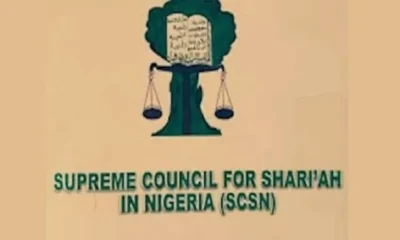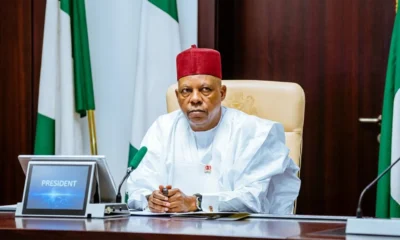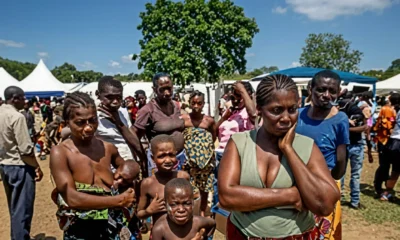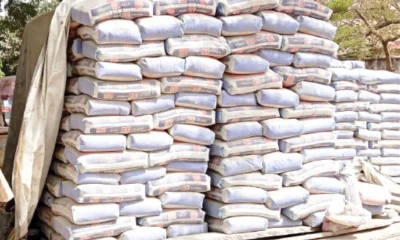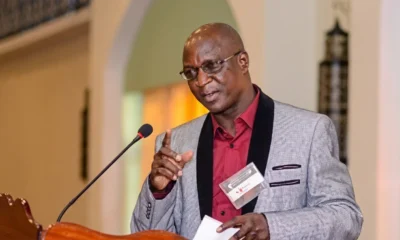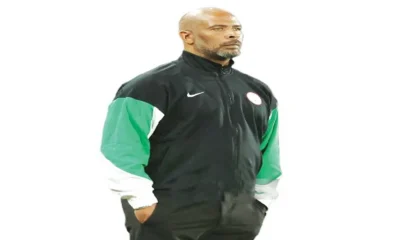News
Deputies Sidelined As Governors Plan 2027 Succession

Feelers from across the country suggest that many deputy governors in the current political dispensation are not actively in line to succeed the governors, as the political atmosphere in the states indicates.
Our correspondents nationwide gathered that as second-term governors prepare to leave the stage for their successors, none appear to be considering their deputies as likely successors.
This is despite the prevailing general conviviality between governors and their deputies.
Unlike in previous eras, the trend of deputy governors being at loggerheads with their principals, or engaging in silent battles with their bosses who have already endorsed successors to replace them, is not very pronounced now.
KWARA: – Deputy Sidelined, Zoning Favours Kwara North
The Kwara State governor, AbdulRahman AbdulRazaq, will complete his second term in 2027, but there are no indications that he would be succeeded by his deputy, Mr Kayode Alabi.
The political atmosphere in the state seems to favour Kwara North senatorial district producing the next governor; Alabi hails from Kwara South.
Kwara North has not produced a governor since 1999, while Kwara South has occupied the state’s number one political seat for eight years, and by 2027 Kwara Central would have occupied the seat for 20 years.
Two political analysts, Comrade Abdul-Rahoof Bello-Labelabe and Comrade AbdulLateef Ishowo, have advanced reasons why it has always been difficult for deputies to succeed their bosses.
Comrade Abdul-Rahoof Bello-Labelabe said, “Deputies are glorified alternative governors, who run elections on the same party ticket as their effective governors. Deputies are, in most cases, not the choice of the governors but are forced down the governors’ throats by the party to fulfil the electoral statutory requirements.
“Since the constitution does not give deputies any specific duties, they are usually regarded as spare tyres by the governors.
“This official idleness and/or isolation of the deputies breeds uneasiness, envy and mistrust. This naturally leads to pent-up anger and a sour relationship with their bosses.
“Against this background, governors run their administrations, keeping their deputies in the dark. Therefore, at the end of the governors’ tenure, the fear of payback or retributive justice would start to run riot in their minds, and they would need to look for a more loyal person to succeed them in order to have a safe landing and relative peace after stepping out of office.”
For his part, Comrade AbdulLateef Ishowo said, “It depends on the players. While some deputies are terrible and harbour inordinate ambition, some bosses are unnecessarily bossy.
“Take fotoresident Atiku Abubakar and former President Olusegun Obasanjo, for instance; while the latter generously left the political front to the former, the advantage was seized by Atiku as he attempted to uproot his boss. It’s a two-way situation.”
BORNO: Power Equation Blocks Kadafur’s Ambition
The political equation that has been the tradition of Borno politics since the inception of democracy in 1999 would pose a major obstacle for the present deputy governor of the state, Alhaji Usman Kadafur, to succeed Governor Babagana Umara Zulum at the end of his tenure in the next election year.
Speaking to our correspondent in Maiduguri, a political analyst and indigene of southern Borno, where the deputy governor hails from, Adamu Ali, said it is highly unlikely for Kadafur to succeed Zulum, noting that in the first instance, Kadafur is not the most acceptable even in his own local government area of Biu in southern Borno.
Ali, who stated that Kadafur has not positively impacted the people of his area, added that there has not been a formal agreement that power should be shifted to southern Borno, where the deputy governor emerged from.
He said, in fact, the only time hope was raised for a power shift to southern Borno was during the administration of former Governor Ali Modu Sheriff. In the Uba area of southern Borno, Sheriff made a pronouncement that, after him, power should shift to southern Borno because of his friend, the late Zubairu Maina. However, immediately after Zubairu Maina died, all that arrangement ceased.
The political analyst said, “When you look at the arrangement, before one emerges as governor, there is a process, and the process is usually through a primary election. Primary elections are conducted by delegates, and the predominant delegates are from the Kanuri ethnic group who control northern and central Borno.
“The southern Borno has only nine local government areas, and no matter how they try, even if all nine local governments are united, they will only produce one-third of the delegates. So for this reason, it will be difficult for the current deputy governor, Kadafur, to succeed his boss, Governor Zulum, let alone power shifting to southern Borno unless something unimaginable occurs.”
LEADERSHIP Weekend gathered that since the inception of democracy, the Kanuri tribe in Borno North and Central has been producing the governor, while the position of deputy governor is allocated to the people of southern Borno.
On why deputy governors do not usually succeed their governors, a senior member of the political class in Borno, Alhaji Ahmed Ashemi, said governors usually do not like the men who have served them to climb to the top and eventually become as powerful as they once were when they became governors.
Ashemi said, “After eight years or four years, governors don’t want their deputies to become governors and become the sheriffs of the town.
“How can someone I have been sending (on errands) and who has been following me suddenly become the governor? And now, whenever I come, I will be on the other side. In some places, because a particular ethnic group has been occupying the governorship seat, the holders of the power will not want it to shift to perhaps a minority ethnic group through the deputy governors, unless issues like death change the equation.”
GOMBE: Religious Politics Clips Deputy’s Wings
As Governor Muhammadu Inuwa Yahaya of Gombe State gets set to step down in 2027, the state’s political atmosphere has begun to heat up. The question dominating political circles remains: “Who will emerge as the next governor?”
Deputy Governor Dr Manassah Daniel Jatau, a southern Christian from Balanga Local Government, could have been at the centre of this conversation with a chance of succeeding his boss, but since the return of democracy in 1999, Gombe politics has followed a predictable pattern shaped by regional and religious considerations.
Every elected governor—from Abubakar Habu Hashidu to Danjuma Goje, Ibrahim Hassan Dankwambo, and now Inuwa Yahaya—has hailed from the predominantly Muslim North, while their deputies have come from the Christian-dominated southern part of the state.
For analysts like Dr Musa Tukur, a political scientist at Gombe State University, while this pairing model has promoted inclusiveness, it has also created a succession wall. No deputy governor in Gombe’s democratic history has ever succeeded his principal.
This suggests that the electorate in Muslim-majority local councils tends to vote for Muslim candidates, while Christian-majority districts prefer Christian contenders. This explains why, since 1999, the governorship has remained with the northern Muslim bloc.
Thus, observers still believe that the 2027 contest is unlikely to break the pattern, making Jatau’s path to power difficult. For a political commentator Ibrahim Alkali, “Gombe is not yet politically ripe for a southern Christian governor, especially with APC’s internal dynamics.”
While some comments on social media suggest speculation about Governor Yahaya’s preferred successor, with names like Engr. Aliyu Muhammad Kombat and Arc. Yakubu Yunusa of Lubell Nig Ltd., analyst Abdulrahman Musa argues that Yahaya’s approach mirrors that of leaders who see succession as legacy protection, not godfatherism.
While Jatau remains a loyal deputy and an experienced technocrat, insiders say he is not among the front-runners in the succession conversation. Still, some argue that a Jatau candidacy could serve as a test of the state’s political maturity.
Imo State: Deputy Gov Lacks Clout in a Fierce Succession Race
The political scenario in Imo State does not suggest that the deputy governor, Lady Chinyere Ekomaru, would be allowed to take over from the present administration of Governor Hope Uzodimma.
The reason for this is not far-fetched, as the deputy governor, Lady Ekomaru, appears more like a greenhorn, lacking the capacity, political structure, and dexterity required to govern a complex state like Imo.
This could be attributed to her background, having spent most of her career as a public servant, with little or no political exposure.
A closer look at her disposition presents a picture of someone who was perhaps drafted into the political terrain merely to fill the space, and who may not harbour the ambition of succeeding her boss.
A political analyst, Dr Harold Onumo, told LEADERSHIP Weekend that most governors are not disposed to allowing their deputies to succeed them due to selfish interests, fear of the unknown, and an inferiority complex.
He explained that some governors fear that allowing such opportunities may make their deputies richer and more influential than they are.
According to him, governors usually want to remain theeeeee ones calling the shots and to always be seen as the boss..
“They want to remain the boss and control the political structure. They prefer a situation where they are the only cock that crows within the political landscape,” he said.
For Dr Chinyere Ekomaru, current deputy governor of Imo State, succession plans may be herculean, particularly with the rising clamour by political gladiators to occupy the Douglas House.
Since the return to democracy in 1999, no governor in Imo State has successfully installed a successor.
While Chief Achike Udenwa preferred Chief Iyke Ibeh, political heavyweights instead rallied behind Dr Ikedi Ohakim.
When Ohakim sought a second term, former President Goodluck Jonathan supported Owelle Rochas Okorocha instead.
When Okorocha attempted to install his preferred candidate—his son-in-law, Chief Uche Nwosu—political forces resisted, leading to the emergence of Emeka Ihedioha, who was later replaced by Uzodimma.
Currently, a brewing war exists between Owerri and Okigwe senatorial zones over who should succeed Uzodimma.
Owerri zone argues that they have only held the governorship for about eight months under Chief Emeka Ihedioha since 1999. Meanwhile, Okigwe zone claims that their own tenure, truncated during Dr Ikedi Ohakim’s term, must be completed before Owerri can reclaim the seat.
Analysts argue that Dr Chinyere Ekomaru, as a woman, does not have the political clout or influence to succeed Uzodimma, as she has yet to make a significant impact on any major political issue within the state.
Sir Sunny Ndukwu, a political stalwart of the Peoples Democratic Party from Ngor Okpala, said Ekomaru does not stand any chance.
According to him, the quest by the Owerri zone is now for the office of the governor, not that of deputy again.
He stated that if the late Chief Emmanuel Iwuanyanwu, former President General of Ohanaeze Ndigbo Worldwide, were still alive, Ekomaru might have stood a chance. But with his demise, her political prospects have diminished.
“In the past, for over two decades, the political future of Owerri Zone was often discussed at the palatial residence of the late Chief Emmanuel Iwuanyanwu. The current deputy governor of Imo State is a product of Iwuanyanwu’s political dynasty.
“ I can tell you that if he were still alive, Ekomaru would be among the strongest contenders for the governorship seat. But today, Iwuanyanwu is no more, and that political edge over her peers is gone—if indeed she is nursing any ambition for 2027.”
He further said: “In my honest opinion, I don’t see Governor Uzodimma settling for Ekomaru as his preferred successor. The Imo gubernatorial race is going to be a fierce battle, and I doubt the governor would settle for someone who lacks a formidable political structure across the length and breadth of the state.
“Although Uzodimma is an incumbent, whoever he chooses to succeed him must be well-grounded politically, because the outcome of the 2023 governorship election may differ significantly from what we shall experience in 2027,” Ndukwu said.
Though Uzodimma has yet to declare his preferred candidate, political watchers suggest it may be a herculean task—but potentially achievable via his strong political connections within the APC.
Bauchi: Ministers, Loyalists Jostle to Succeed Bala Mohammed
The race to occupy Bauchi Government House in 2027 has quietly begun, long before campaign banners and slogans appear. Behind the scenes, alliances are being formed, meetings are being held in Abuja and Bauchi, and ambitions are hardening.
Governor Bala Mohammed of the Peoples Democratic Party (PDP) is in his final term, and the scramble to replace him is attracting some of the biggest political names in the state’s history.
What makes this race unique is the calibre of aspirants: federal ministers, senators, commissioners, technocrats, and political strategists—all eyeing the same seat. It is not merely an election, but a clash of influence, legacy, and regional power blocs.
Though a smaller party, the African Democratic Congress (ADC) boasts two prominent contenders: former Chief of Air Staff and 2023 APC flagbearer, Amb. Sadique Abubakar, who returns to the contest with military discipline, diplomatic experience, and a strong support base.
Besides him, there is Sen. Halliru Dauda Jika, a grassroots politician with deep ties to Bauchi politics.
Their challenge, however, lies in mobilising a weaker party structure.
The All Progressives Congress (APC) arguably has the most intimidating line-up.
Senator Shehu Buba Umar brings legislative experience, grassroots support, and a solid structure.
Bala Wunti is a prominent figure in the oil and gas sector. Despite being his first political outing, Wunti is already gaining traction in Bauchi.
Two serving ministers raise the stakes even further: Minister of Health and Social Welfare, Prof. Muhammad Ali Pate, is a globally respected technocrat while his counterpart in Foreign Affairs, Amb. Yusuf Tuggar, has strong international networks.
For the APC, the question is not who wants the ticket—but whom the party can unite behind.
The ruling party, the PDP, faces internal succession drama.
Dr Yakubu Adamu, Commissioner of Finance and one of the governor’s most trusted allies, is fresh from the banking sector but lacks deep political roots.
Farouk Mustapha, Commissioner for Special Duties and Rural Development, brings grassroots energy and bipartisan goodwill. Having contested for the governorship under the APC before switching to the PDP ahead of the 2023 elections, he also served as director general of Governor Bala Mohammed’s campaign.
Usman Adamu Sufee is another loyalist contender.
However, the potential entry of Sen. Abdul Ningi—a political heavyweight with statewide reach—could shift the balance and challenge the governor’s control.
With ministers, commissioners, technocrats, career politicians, and party loyalty clashing with personal ambition, 2027 is shaping up to be Bauchi’s most unpredictable gubernatorial contest in decades.
The countdown has already begun—quietly, strategically, and intensely.
Nasarawa: Governorship is rotational, deputy governor eyeing Senate seat
In Nasarawa State, the incumbent deputy governor, Dr Emmanuel Akabe, is reportedly eyeing the southern senatorial seat, possibly acknowledging that the existing power rotation arrangement does not favour his zone.
Our correspondent reports that the arrangement, which has been in place since 1999, allows for the governorship seat to rotate to a designated zone upon the expiration of two terms from another.
It is expected that in 2027, power will shift to Nasarawa West (Keffi zone).
Billboards bearing messages of Dr Akabe’s senatorial ambition are already visible in Lafia, the state capital, and other parts of the southern senatorial district.
The current occupant of the seat, Senator Mohammed Onawo, is believed to be nursing other ambitions.
Deputy Governor Akabe, LEADERSHIP Weekend can report, enjoys cordial relations with his boss, Governor Abdullahi Sule, and has thus far been given a free hand to operate.
Oyo: Deputy Quiet as Zoning Fuels External Pressure
In Oyo State, the deputy governor, Barrister Bayo Lawal, has not indicated any interest in contesting the 2027 governorship election.
There has also been no known rancour between him and his principal, Governor Seyi Makinde.
Although there have been calls for the Oke-Ogun zone—where the deputy governor hails from—to produce the next governor, Lawal has not publicly declared any intention to run.
However, candidates from other political parties have begun to show interest in contesting.
Lagos: Power Brokers Eye Others, Deputy Not In Frame
In Lagos, it is believed that the state governor, Babajide Sanwo-Olu, may not have the political clout to influence the choice of his successor.
Sanwo-Olu’s deputy, Dr Obafemi Hamzat, is reportedly not among those being considered as potential replacements for the governor in 2027, by which time both men would have served two terms together.
Previously, Hamzat served as Commissioner for Science and Technology during the administration of President Bola Tinubu when he was governor of Lagos State. He retained the same position under Governor Babatunde Fashola, who assumed office in 2007.
Sources close to influential figures within Lagos politics suggest that it would be difficult to make Hamzat governor due to his experience and independence. According to one source, “It would be difficult to control such a man with his experience.”
Since leaving office in 2007, President Tinubu has played a decisive role in determining who becomes governor of Lagos State.
Ogun: Deputy Not in the Frame, Heavyweights Mobilise
Similarly, in Ogun State, Governor Dapo Abiodun may not be able to influence the emergence of his deputy, Noimot Salako-Oyedele, as his successor.
Senator Solomon Adeola, chairman of the Senate Committee on Appropriation, and a former Nigerian High Commissioner to the United Kingdom, are reportedly mobilising support to contest the governorship and succeed Abiodun.
(Leadership Newspaper)
-

 News19 hours ago
News19 hours agoNo Power Can Stop Muslims From Practising Shariah – Shariah Council
-

 Sports10 hours ago
Sports10 hours agoUCL Round of 16: Osimhen to face Liverpool as Real Madrid, Man City renew rivalry
-

 Business16 hours ago
Business16 hours agoFG deepens CREDICORP, targets wider coverage, disbursements
-

 News16 hours ago
News16 hours agoOver 100 terrorists storm Benue villages, kill 150 – Witness tells court
-

 Business16 hours ago
Business16 hours agoBag Of Cement Climbs To N11,000
-

 News17 hours ago
News17 hours agoEFCC detains Ozekhome over ‘Tali Shani’ UK property affair
-

 News16 hours ago
News16 hours agoNorthern Christian leaders drop ‘CAN’ title, adopt old identity
-

 Sports19 hours ago
Sports19 hours agoChelle justifies $130k salary demand, denies exit threat



